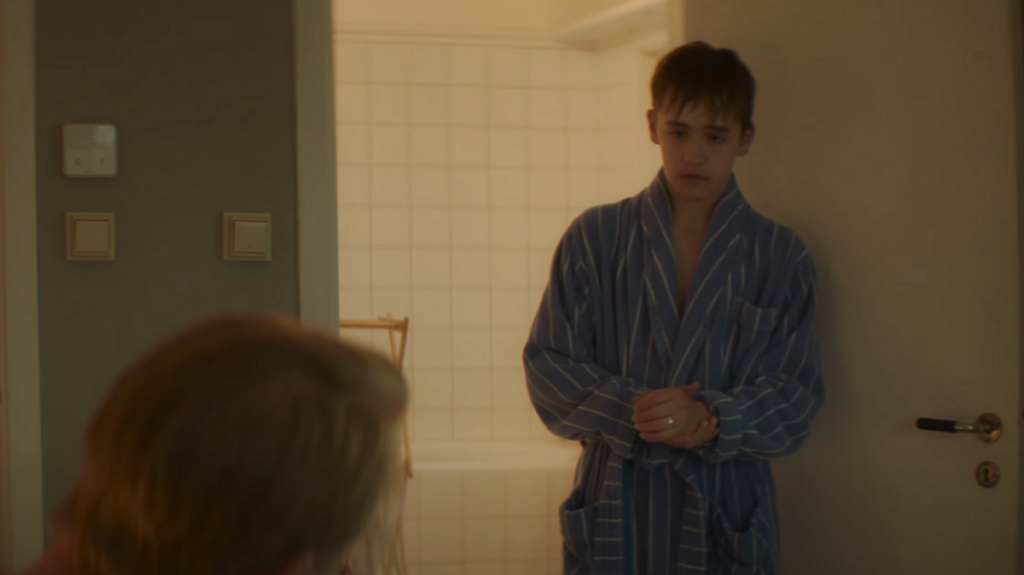Norwegian filmmaker Dag Johan Haugerud brings his thoughtful touch to the complex subjects of gender, sexuality, and self-identity in his latest drama, Sex. Centering on two married chimney sweeps working in Oslo, the story follows their personal awakenings and journeys of self-discovery after surprising revelations about their sexual desires and orientations.
Without sensationalism or melodrama, Haugerud crafts a compassionate character study that embraces vulnerability. His script tackles topics like masculinity, relationships, and societal expectations with nuance. Visual style is understated, with contemplative camerawork allowing us to closely examine the lead characters, played wonderfully by Jan Gunnar Røise and Thorbjørn Harr. Their subtle performances reveal so much about the suppression of identity.
While the pacing is slow and the plot is largely dialogue-driven, there’s real emotional honesty in these conversations between spouses, friends, even a doctor. It’s a thoughtful rumination on the labels we assign ourselves and the walls we build in intimate relationships. Haugerud doesn’t provide tidy resolutions, but the questions Sex raises linger in your mind long after.
Navigating Fluid Desires
At the heart of Sex are two married men who work together as chimney sweeps in Oslo. We’re introduced to them as close friends, chatting over lunch. When one recounts a dream involving David Bowie gazing at him as a woman, it opens up a deeper conversation about sexuality. The other then admits to spontaneously having sex with a male client—an enjoyable experience that didn’t make him feel gay, just desirous in that moment.
This revelation troubles his wife when he tells her, not because he cheated but because his fluid sexuality challenges their relationship. We observe them grappling to understand this new dynamic. Meanwhile, the boss continues dissecting his dream and what it suggests about his identity. When singing with his choir, he notices vocal changes seemingly related to stress.
As both men embrace these vulnerabilities, their suburban lives are upended but also enriched. Their journeys involve humorous, thoughtful talks with spouses, doctors, even their teenage sons. We piece together the pressures they’ve felt to conform to traditional masculine roles. Now, tentative self-exploration allows them to acknowledge repressed aspects of themselves.
There is no tidy resolution as the story closes. Transformation happens slowly, gently. But in well-observed scenes like a mesmerizing choir performance, we feel the characters progressing. Where they end up matters less than their deeper acceptance of complexity—in themselves and their loved ones. As audiences, we’re left to ponder our own preconceptions.
Examining Identity and Relationships
At its core, Sex explores the fluidity of gender, sexuality, and self-perception. Rather than reinforce stereotypes, Haugerud dismantles assumptions about masculinity. His protagonists discover that heterosexuality doesn’t negate moments of homosexual desire, nor does this newfound fluidity undermine their self-conceptions. The film reveals identity as a spectrum, an ongoing process of evolution.
Nuanced depictions of these men push against toxic masculine ideals. Emotional openness and vulnerability become sources of strength in their relationships, not weakness. As they grow more receptive to feminine aspects of themselves, we see positive impacts on their mental health and connections with loved ones.
Introspection catalyzes their transformation. Conversations shine light on years of repression and adherence to societal expectations. A dream, a choir rehearsal, a doctor’s visit—all encourage self-reflection about who they are under the surface. We observe meaningful, sometimes amusing exchanges where the characters think aloud to understand themselves better.
At its heart, Sex is a story about relationships—between spouses, friends, parents and children. Haugerud explores intimacy through every interaction. Chimney sweeps by trade, the protagonists also clean out their emotional flues, breaking down walls erected over the years. Their marriages face instability but become stronger as they embrace uncomfortable truths. Rather than provide easy answers, these journeys trace all the steps— missteps included—of deepening bonds.
While a distinctly Norwegian perspective shapes the story, its universal themes around identity resonate across borders. As viewers, regardless of orientation, we’re prompted to examine our own assumptions in these thoughtful vignettes about what it means to be seen and embraced as our full selves.
Crafting a Thoughtful Tone
Haugerud directs with subtle assurance, allowing the Frankfurt school of filmmaking to influence his approach. Camerawork favors stillness and contemplation over kinetic cutting. Cinematographer Cecilie Semec composes elegant frames, often from a distance, to observe minutiae of facial expressions and body language. Oslo’s towers and construction sites aptly reflect the dismantling of inner walls.
The director’s vision shines through most in pacing and tone. He’s in no rush to arrive at resolutions. Instead, Haugerud lingers on poignant exchanges between characters, underscoring the importance of emotional courage in relationships. Moments breathe with unspoken meaning.
Peder Kjellsby’s jazz-inflected score feats muted brass and floats through interludes like thoughts we can’t dismiss. Soulful musical performances provide respite from dialogue as the choir rehearses works like Nick Cave’s “Into My Arms.”
Grounding the film are Røise and Harr as the chimney sweeps. Their quiet intensity and vulnerability elicit empathy. We see restraint give way to courage as they open up. Supporting performances enhance the film’s realism—particularly spouses played by Siri Forberg and Birgitte Larsen. Their patience and care for partners despite confusion reads as pure devotion.
Altogether, Haugerud helms this understated drama with humility, compassion, and insight into human complexity. He constructs an intimate setting to closely study how identity evolves when given space to stretch.
“Explore the battle against misinformation in the digital age with our How to Build a Truth Engine review. Learn about the efforts to safeguard facts and develop new tools to curb the spread of misleading claims online.”
A Compassionate Perspective
While some may yearn for more conclusive endings, Sex offers nuanced storytelling over simplistic solutions. It’s a film that lingers more than resolves. Patient viewers will discover emotional truth in these understated stories about shedding societal expectations to embrace identity.
Haugerud constructs an intimate tableau to explore the spectrum of masculinity, sexuality, and vulnerability. His compassionate lens finds the humanity and common ground in experiences beyond our own. It’s a thoughtful rumination on the labels we assign ourselves and the walls we build in relationships.
Audiences have much to gain from quiet conversations in Sex. We see how listening and self-reflection strengthen bonds, though the path includes awkward steps. Its sobering lessons about emotional courage and unconditional love hold universal resonance.
As the chimney sweeps discover, suppressing parts of ourselves clouds our vision. The more we confront biases and assumptions, the clearer we see our partners. While cleaning out their flues, they clear existential doubt from their skies. What remains is hopeful acceptance of life’s beautiful complexities, including their own.
The Review
Sex
With compassion and wisdom, Haugerud crafts an intimate character study that lingers. Sex will resonate most with audiences seeking emotional truth over easy answers. Shedding light on the fluidity of masculine identity and sexuality, it finds universality in the vulnerable spots we hide. Outstanding performances and thoughtful dialogue drive this quietly captivating film about embracing the beautifully complex nature of ourselves and our most precious relationships.
PROS
- Nuanced exploration of gender roles and sexuality
- Strong lead performances by Røise and Harr
- Thoughtful direction and contemplative pace
- Honest dialogues about vulnerability and intimacy
- Compassionate perspective on fluidity of identity
CONS
- Slow pacing with minimal plot movement
- Lack of clear narrative resolution
- Restrained visual style that may bore some
- Narrow focus on bourgeois heterosexual men

















































